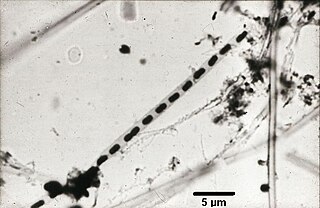Sphingopyxis is a bacterial genus.

The Comamonadaceae are a family of the Betaproteobacteria. Like all Pseudomonadota, they are Gram-negative. They are aerobic and most of the species are motile via flagella. The cells are curved rod-shaped.

The Methylobacteriaceae are a family of Hyphomicrobiales.

The Alteromonadales are an order of Pseudomonadota. Although they have been treated as a single family, the Alteromonadaceae, they were divided into eight by Ivanova et al. in 2004. The cells are straight or curved rods. They are motile by the use of a single flagellum. Most of the species are marine.
Oceanospirillaceae is a family of Pseudomonadota. Most genera in this family live in environments with high concentrations of salt; they are halotolerant or halophilic. They are marine, except Balneatrix which is found in fresh water and Venatorbacter, which is from terrestrial origin.All members are strictly aerobic, except Neptunomonas which can perform fermentation reactions.
The Alteromonadaceae are a family of Pseudomonadota. They are now one of several families in the order Alteromonadales, including Alteromonas and its closest relatives. Species of this family are mostly rod-like shaped and motile by using one polar flagellum.
Microvirga is a genus of bacteria from the family of Methylobacteriaceae.
The Lachnospiraceae are a family of obligately anaerobic, variably spore-forming bacteria in the order Eubacteriales that ferment diverse plant polysaccharides to short-chain fatty acids and alcohols (ethanol). These bacteria are among the most abundant taxa in the rumen and the human gut microbiota. Members of this family may protect against colon cancer in humans by producing butyric acid. Lachnospiraceae have been found to contribute to diabetes in genetically susceptible (ob/ob) germ-free mice.
Gaiella occulta is a rod-shaped and non-motile bacterium from the genus Gaiella which has been isolated from deep mineral water in Portugal.

Nitriliruptor alkaliphilus is a non-spore-forming and non-motile bacterium from the genus Nitriliruptor which has been isolated from sediments from a soda lake in Siberia in Russia.
Salipaludibacillus is a gram-positive genus of bacteria from the family of Bacillaceae.
Salirhabdus is a genus of bacteria from the family of Bacillaceae.
Chitinispirillum is a genus of bacteria from the family of Chitinispirillaceae with one known species. Chitinispirillum alkaliphilum has been isolated from hypersaline lake sediments from the Wadi el Natrun valley in Egypt.
Chitinivibrio is an extremely haloalkaliphilic genus of bacteria from the family of Chitinivibrionaceae with one known species. Chitinivibrio alkaliphilus has been isolated from hypersaline lake sediments from Wadi al Natrun in Egypt.
Catelliglobosispora koreensis is a species of bacteria from the family Micromonosporaceae. Catelliglobosispora koreensis has been isolated from soil from a gold mine cave from Kongju in Korea.
Hamadaea flava is a Gram-positive, aerobic and non-motile bacterium from the genus Hamadaea which has been isolated from soil from a tobacco farm from Yunnan, China.
Pacificibacter is a genus of bacteria from the family of Rhodobacteraceae.
Marinifilum is a genus of bacteria from the family of Marinifilaceae.
Niabella is a genus of bacteria from the family of Chitinophagaceae.
Taibaiella is a genus of bacteria from the family of Chitinophagaceae.



